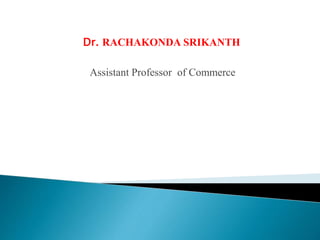
Accounting process
- 1. Dr. RACHAKONDA SRIKANTH Assistant Professor of Commerce
- 2. ACCOUNTING PROCESS Accounting process also called as Accounting cycle Accounting cycle is a process of a complete sequence of accounting procedures in appropriate order during each accounting period. Accounting process is a combination of a series of activities that begin when a transaction takes place and ends with its inclusion in the financial statements at the end of the accounting period.
- 4. 1. Identifying and Analyzing Business Transactions The accounting process starts with identifying and analyzing business transactions. Only those that pertain to the business entity are included in the process.
- 5. 2. Recording in the Journals A journal is a book in which transactions are recorded at first. Hence, it is called book of prime entry or original entry. Business transactions are recorded in the form of journal entries by using the double-entry bookkeeping system. Each entry has at least two accounts (one debited and one credited). The process of recording transaction in the book journal is called as “Journalising”. Transactions are recorded in “chronological order” and as they occur.
- 6. 3. Posting into Ledger It is also known as the principal book of accounts as well as the book of final entry. It is a book in which all ledger accounts and related monetary transactions are posted and maintained in a summarized and classified form. It is a permanent record of all transactions. it helps in the creation of trial balance. The process of transforming journal entries to Ledger is called as “Posting”
- 7. 4. Balance of Accounts •At the end of every accounting year all the accounts which are operated in the ledger book are closed, totalled and balanced. • Balancing of ledgers means finding the difference between the total of debit side and total of credit side of a particular account • total difference should be recorded on the lesser side of an account.
- 8. 5. Preparation of Trial Balance •Trial Balance is a statement in which the balances of all ledger accounts are assembled into debit and credit columns • T.B. is a base for the preparation of financial statements • the objective is to preparation of T.B. is to check the arithmetical accuracy of the ledger accounts. •If there is any difference between the totals of debit columns and credit column , should be transferred temporarily “ Suspense account” •It helps to rectify the mistakes or errors.
- 9. 6. Preparation of Financial statements •It is the last stage in the accounting cycle • It includes trading, profit and loss account, and balance sheet. • Trading account: It helps in determining the gross profit or gross loss of a business concern, made strictly out of trading activities means buying and selling activities. It considers only direct expenses.
- 10. •Profit and Loss account: •It is opened by recording the gross profit on the credit side or gross loss on the debit side. • It records only indirect expenses and indirect incomes •It finds Net Profit or Net Loss of a business enterprise •Both trading and profit and loss accounts shows operational performance of business •Balance Sheet: •It is a statement and shows the financial position of a business •It shows business's net worth at the end • Assets = Liabilities + Equity